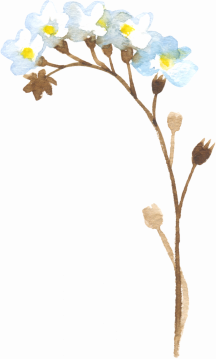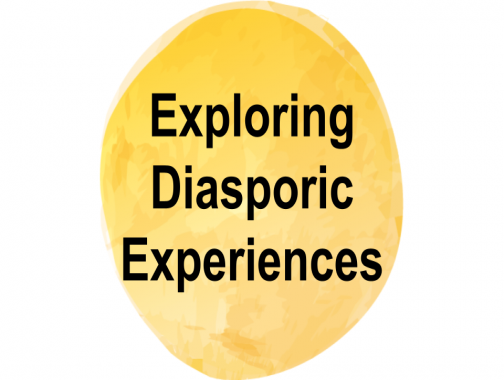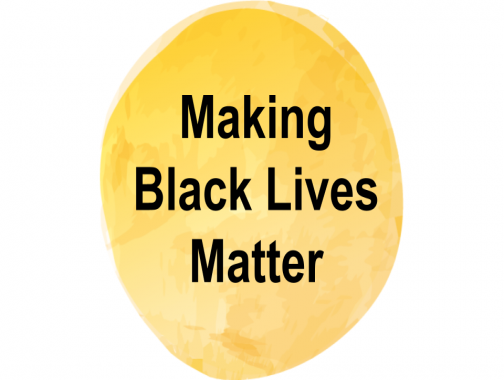
For some, there is a tendency to root discussions of Blackness in the realm of trauma when the stories are more complex than that. The term "Black" represents the diasporic collective of peoples who may identify as being African, Caribbean, and Black and serve as a way to recognize the many intersectional identities for people of African descent (Scarborough Charter, 2021; York University, 2022). In the UTSC Campus Curriculum Review, "Black Knowledges" is understood as Africentric critical and pedagogical approaches that resist and disrupt the violent erasure of Black history through slavery and colonialism, including in academic contexts, by reframing those historical narratives and foregrounding the experiences and contribution of Black individuals and communities.
Among the collective of Black knowledges, there are stories rooted in trauma, connected to institutional oppression, and there are historical and contemporary narratives of resistance, creativity, and being. This section is intended to find a balance that acknowledges the presence, humanity, and flourishing of Blackness in a context too often rooted in the absence and problematic stereotypes.
FAQ - Black Knowledges
Statistics and Figures
- The Diversity of the Black population in Canada: An overview was published in February 2019 by Statistics Canada to explain the composition of the population based on place of birth, generational status, ethnic and cultural origin, and settlement locations across the country.
- The Blackness in Canada Project was developed by the Canadian Race Relations Foundation, York University's Institute for Social Research, and the Social Sciences and Humanities Research Council. Based on nationwide data, the site contains both the Black Canadian National Infographic and the Black Canadian National Survey Interim Report 2021.
The Scarborough Charter was signed in 2021 and published in November 2022 by the Inter-Institutional Advisory Committee for the National Dialogues and Action for Inclusive Higher Education and Communities which are committed to “redressing anti-Black racism and fostering Black inclusion in universities and colleges across Canada.” The document is broken into 4 key sections: 1. Black Flourishing, 2. Inclusive Excellence, 3. Mutuality, and 4. Accountability.
For the purposes of the curriculum review, the sections on teaching and learning are most relevant. A brief summary of each section is noted here:
1.3.1: cultivating naming practices that foster Black belonging, knowledge development and sharing
1.3.2: [enabling, supporting, acknowledging] Black student leadership, insights, energy and actions throughout academic programs, curricular,and co-curricular development
2.31: [the promotion] of curricular development across academic disciplines that decentres epistemic Eurocentrism [and] broadens disciplinary canons to include Black expertise and knowledges
2.3.2.2: [supporting] Black thriving through to program completion
3.3.1: [enabling mutuality by] building grade school through university and college outreach programs
3.3.2: adopting policies... and practices that sustain harassment-free classrooms and other learning environments
4.3.1: provide anti-Black racism education for all members of the university... while developing performance expectations for faculty and staff that build capacity on anti-racism and Black inclusion
Related Viewing: Watch a video on the Scarborough Charter signing (Video Length: 1:00)
The University of Toronto report, builds on the term "anti-Black racism" as articulated by Dr. Akua Benjamin (1993) to "highlight the unique nature of systemic racism experienced by Black Canadians, and the history and impact of slavery and colonization on people of Black-African descent in Canada" (p.12). In the context of the curriculum review, there are three sections that are particularly relevant:
Systemic Recommendations
One of the systemic-level recommendations was for staff, students, and faculty to engage in Anti-Black racism training. Opportunities for learning include:
- Dismantling Anti-Black Racism in Schooling, Education, and Beyond: Resource Guide was developed by the Centre of Integrative Anti-Racism Studies at OISE. The resource presents a complex portrait of experiences related to Black communities in Canada, examining Black feminism, health and wellness, and anti-racist and anti-colonial theory.
- Dismantling Anti-Black Racism: A Toolkit for Health Professionals was developed by the Faculty of Health Sciences at Queens University to support a deeper understanding of anti-Black racism and anti-racist practices. Related Viewing: Watch a video on Anti-Back Racism from the Canada School of Public Service
- The Black Cultural Competency Toolkit was developed by the Faculty of Applied Science and Engineering as part of their commitment to addressing anti-Black racism, promoting Black inclusion, and fostering Black excellence.
- Action Plan on Black Inclusion: A Living Document for Action was developed by York University to combat Anti-Black racism. The list of proposed objectives and activities may prove informative to your department or unit.
Faculty, Instructors & Librarians' Recommendations
The Centre for Teaching Support and Innovation (CTSI) is one of the faculty-facing offices providing support for developing more inclusive teaching and learning environments. Currently, there is an Equity, Diversity and Inclusion resource page for the tri-campuses highlighting:
- Creating an Inclusive Course & Classroom: Strategies for Instructors
- Syllabus Design & Course Information
- Course Design for Inclusive Teaching
- Inclusive Teaching
The UTSC Library created a downloadable multimedia resource critically examining anti-Black Racism, Whiteness, and anti-racism
Anti-Racist Pedagogy is a module developed by Nicola Dove, Educational Developer at the University of Toronto, Scarborough. The module provides resources and general guidance for integrating anti-racist pedagogical approaches in the following areas:
- Teaching principles and practice
- Curriculum and course development
- Relevant resources
Student & Curricula Recommendations
In Recommendation A.10 in the University of Toronto Anti-Black Racism Task Force Report, students noted that “more content on histories of people of African ancestry, before Columbus, should be offered in all disciplines. Black peoples’ histories should not be located within the pedagogy of victimhood.” The content posted in the Black Knowledges section is intended to showcase the richness, criticality, and diversity of Black people.
At UTSC, there are programs created to counter the narratives attached to anti-Black racism and continue contributing to the strength, expression and diversity of diasporic African cultures.
- The Modern-Day Griot Project (MDGP) 2.0 was developed by community partner, Sweet Lime Communications, in partnership with the Office of Student Experience and Wellbeing, The Department of Arts, Culture & Media, The Department of Health and Society and the Community Partnership and Engagement Office (CPE). This project disrupts stereotypes by "creating stories that centre and offer fresh, multi-dimensional narratives on Blackness" (Community Partnerships & Engagement 2022 Annual Report).
- Keeping It 100: Surviving to Thriving Series, developed between CPE and MARTK'D, is a "virtual series centering Blackness and wellbeing [and] self-love, care and what it means to thrive in today's society." These conversations explore emotions, identity, and possibility which offer a counterpoint to pedagogies rooted strictly in victimhood and pain. Related Viewing: Watch the Keeping It 100 preview video on Identity.
The Black Studies Summer Seminar (BLK-S3tudies) is a “comprehensive one-week research-intensive designed to produce generative and fruitful academic debates and professional development for Ph.D. candidates, postdoctoral fellows, pre-tenure faculty, librarians, archivists, researchers and artists” supported by the Department of Arts, Culture and Media. There are extensive resources in the Study section, from academics and artists of the African diaspora, and information about events and the presenters.
Among the videos that have been uploaded to the developing YouTube channel for BLK-S3tudies, “Fugitive Accounts” explores the stories of enslaved Africans. This discussion is hosted by Assistant Professor of African American Literature at Queen's University, Kristin Moriah in conversation with Associate Professor of Romance Studies, Annette-Joseph Gabriel from the College of Literature, Science, and the Arts at the University of Michigan.
[Video Length: 1:40:12]
The Canadian Black Scientists Network “exists to elevate, make visible, celebrate and connect Black Canadians pursuing or possessing advanced degrees in STEMM (Science, Technology, Engineering, Mathematics & Medicine/Health).” This organization was co-founded by University of Toronto Professor of Biological Sciences and Canada Research Chair, Maydianne Andrade.
“Black in Science: The Legacy of Racism in Science and How Black Scientists are Moving the Dial” is a 2021 award-winning Quirks and Quarks episode hosted by Nicole Mortillaro on the legacy of racism in Science and the resistance and accomplishments of Black scientists. Within the episode several websites are featured, highlighting Black excellence in STEM fields:
Where are all the Black Astronomers and Physicists? Racism, Isolation keeping many away (2022) by Nicole Mortillaro examines and comments on the discriminatory streaming practices in high schools and the sense of isolation that emerges from a lack of Black mentors in STEM fields. Additionally, Mortillaro explores the resistance and community building in STEM fields for current and future generations of astronomers and physicists.
BLK: An Origin Story
This four-part documentary series was created by filmmakers Jennifer Holness and Sudz Sutherland of Hungry Eyes Media in 2022. Each episode examines a different region of Canada, sharing stories and perspectives of Canadian history that are largely unknown. The trailer for the series may be previewed and the full episodes are listed and available for viewing through the University of Toronto Library system:
1. Three Epic Migrations, One People
Related Viewing: Watch co-creators Jennifer Holness and Sudz Sutherland discuss the significance of their docuseries as it relates to Canadian history and the significant role of Black Canadians in the development of this nation.
National, Provincial, and Local History
Video Length: 50:19
- "Afua Cooper: My 30-year effort to bring Black studies to Canadian universities is still an upward battle"
- Black History in Early Toronto
- Ontario Black History Society
- Ontario Heritage Trust
Video Length: 1:02
Video Length: 5:27
Video Length: 49:51
Video Length: 34:45
Video Length: 23:03
Our Dance of Revolution was released in 2019 by filmmaker Philip Pike who released a 4 decade-plus history of the Black LGBTQ+ community coming together in Toronto and the activism, resistance, and community they created, which paved the way for future generations of Black Queer folk in Toronto. Here is the trailer for the documentary:
Video Length: 2:37
Related Viewing: View the extra scenes from Our Dance of Revolution.
- Black Is...Black Ain't (1995) is a groundbreaking documentary exploring the layers of Black identity produced by the late African American Gay filmmaker, activist, educator, and poet Marlon Riggs. According to the criterion.com website, the film "breaks down the divides of class, colorism, patriarchy, and homophobia as it issues a stirring appeal for unity."
- Any Other Way: How Toronto got Queer (2017) edited by Stephanie Chambers et al.
- Marvellous Grounds: Queer of Colour Histories of Toronto (2018) edited by Jin Haritaworn et al.
- The Watermelon Woman (1996), directed by Cheryl Dunye, a Black lesbian filmmaker, "takes Black lesbians as its subject matter, but also – and most importantly – as a standpoint from which to challenge the basis of representation, history and how stories are told" (British Film Institute). Considered a classic with multiple awards, it was the 2021 winner of the National Film Registry by the National Film Preservation Board in the United States.
- Our Lives Matter: A Womanist Queer Theology (2015) by Pamela Lightsey, Vice President for Academic and Student Affairs, Associate Professor of Constructive Theology at Meadville Lombard Theological School
- Black Trans* Lives Matter is a TEDxCSU Talk from Professor and Department Chair, Dafina-Lazarus (D-L) Stewart (he and they) at the University of Denver.
- Liberation for Black Trans Women is a New Yorker Documentary by Matt Nadel and Megan Plotka [Video Length: 18:44]
- Black and Queer in Ontario: Community, Labour, Culture was a February 2022 episode of The Agenda, hosted by Nam Kiwanuka exploring the intersections of identity with Kimahli Powell (Rainbow Railroad), Tatiana Ferguson (Black Queer Youth Collective founding member), and Samantha Peters (Black Femme Legal Director of Legal Initiatives and Public Interest ).
- "Black Queer Voices Matter — and These Authors Are Writing a More Inclusive Future for CanLit" was a 2021 CBC "roundtable with five Black queer authors on how the literary world needs to change." One of the participants, Suzette Mayr, observed: "I've had odd experiences at some writers' festivals in the past where I've gotten pigeonholed into strange panels that show the organizers clearly don't know what to do with me. Often it's a thinly disguised "people of colour panel" where different writers of colour are all thrown together even though their books might have nothing else in common. I think there's a fear that our books won't appeal to the general audience, so we're tucked away."
- 2SLGBTQIA+ Black Indigenous People of Colour: Voice in History is a downloadable poster written and created by Emma N. Awe and published by The Canadian Centre for Gender and Sexual Diversity
- The Black Queer Youth Collective was developed in 2017 by providing programs for Black Queer and Trans Youth in Toronto.
- Black Trans* Lives Matter is a TEDxCSU Talk from Professor and Department Chair, Dafina-Lazarus (D-L) Stewart (he and they) at the University of Denver.
- Liberation for Black Trans Women is a New Yorker Documentary by Matt Nadel and Megan Plotka [Video Length: 18:44]

